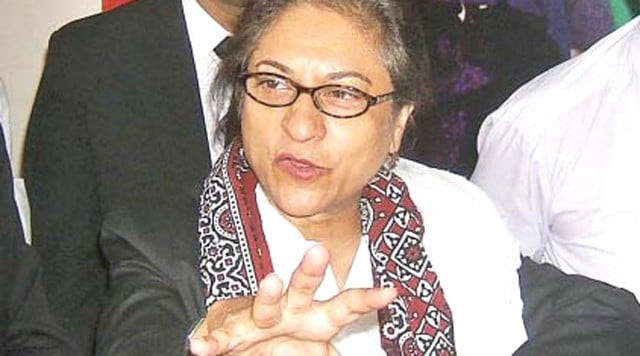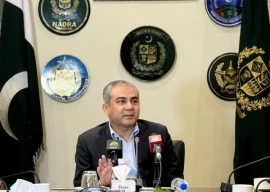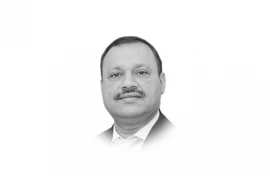
Husain Haqqani has not yet given up hope that the Supreme Court will eventually see things differently – more specifically his defence counsel’s way.
On Monday, his counsel Asma Jahangir, who has refused to represent Haqqani before the SC-appointed judicial commission, moved the court through a petition for review of the order handed down by a larger bench on December 30. The review petition not only challenges the court order to form the commission on the basis of its jurisdiction, but also the appointment of high court judges for the commission. She had earlier stated that SC decision to form a commission was an overreach by the court and a victory for the security establishment.
On December 30, a nine-judge bench of the Supreme Court had formed a three-member commission, comprising the chief justices of the Balochistan High Court, Sindh High Court and Islamabad High Court. The bench had also decided that it had the jurisdiction to hear the matter because the petitioners succeeded in establishing a case of public importance which required the enforcement of fundamental rights.
Filing the review, Jahangir said the court did not have the authority to issue directions to the judges of the high court to constitute a commission because a “commission set up to examine any person or evidence may be deputed to any court except ‘a high court’.”
Jahangir went further to point out that the commission appointed by the court has been exercised through the authority granted to the court under Article 187 of the Constitution read with order XXX1, Rule 1 and 2 as well as order XXXVI of the Supreme Court Rules, 1980, as announced in the judgment of December 30. “Order XXXVI of the Supreme Court Rules has been repealed in 2003,” she said.
She said Article 2A of the constitution, which was cited by the court while forming the commission, could not override the provisions of fundamental rights given in Chapter 1, Part II of the constitution.
“Only fundamental rights given in Chapter 1, Part II of the constitution, can be involved under Article 184(3),” she said.
Jahangir believed that the court, while interpreting fundamental rights, assumed its infraction and the enforcement of fundamental rights and the enforcement order did not redress any such infringement, adding that the terms of reference, determining the scope and ambit of the judicial commission, has not been set out by the court.
She went on to add that her client, Husain Haqqani, has been deprived of moving around freely and confined to Prime Minister Yousaf Raza Gilani’s house despite the fact that he has not been formally charged yet.
President’s immunity
Meanwhile, a petitioner in the Memogate case on Monday raised the question of the president’s constitutional immunity through an application in the SC.
The petitioner, Shahid Orakzai, asked the court to restrain the commission from probing into the unsigned memo because it issued a notice to the president, in violation of the Constitution. President Asif Ali Zardari had earlier ignored the SC’s call for submission of a reply in the Memogate case.
Chief Justice Iftikhar Muhammad Chaudhry had reminded Attorney General Maulvi Anwarul Haq that the court could draw an adverse presumption if the president failed to comply with its orders.
“Only a joint session of the parliament has the authority to investigate or hold an inquiry against the president, according to the dictates of the Constitution,” the applicant said, adding that the Constitution sets conditions for the parliament to issue a notice to the president. The parliament would either charge the president with a physical disability or a violation of the Constitution, he said.
The commission has directly issued notices to Chief of Army Staff General Ashfaq Pervez Kayani and Director-General Inter-Services Intelligence Ahmed Shuja Pasha, instead of going through the federal government, giving the impression that the concerned officials did not fall under the federal government, the applicant added.
The petitioner went on to express his apprehension that the commission might credit Pakistan Muslim League-Nawaz (PML-N) Chief Mian Nawaz Sharif for the probe into the Memogate scandal.
“The Supreme Court did not make the commission to serve political ends. For protecting its impartiality, the court must stay the proceedings forthwith,” he said.
(Read: Banishing memogeist)
Published in The Express Tribune, January 10th, 2012.








1726054615-0/OpenAI-(2)1726054615-0-270x192.webp)









COMMENTS
Comments are moderated and generally will be posted if they are on-topic and not abusive.
For more information, please see our Comments FAQ